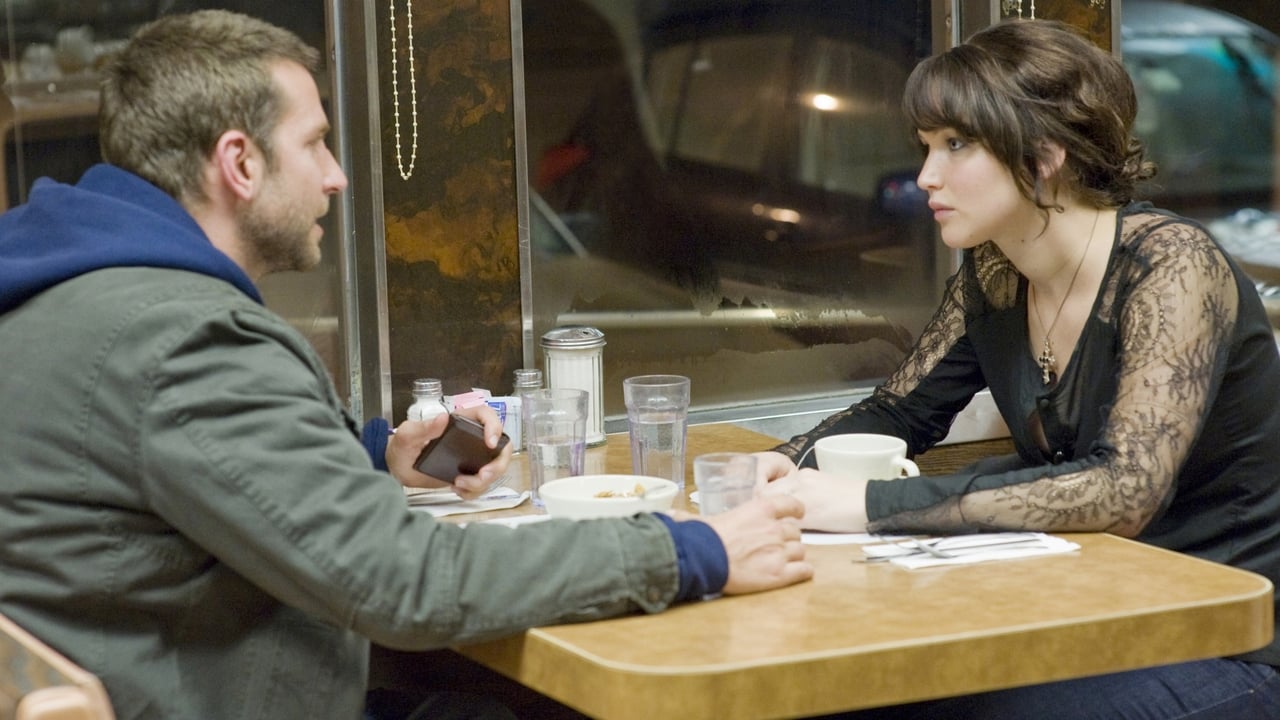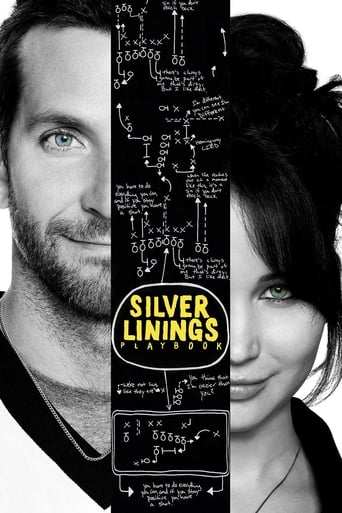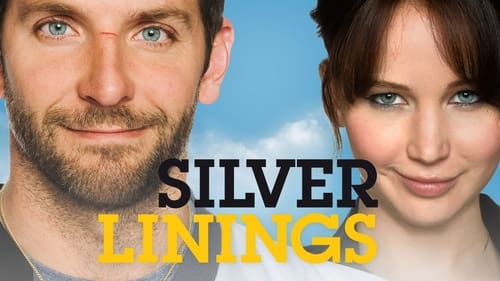



People are voting emotionally.
it is finally so absorbing because it plays like a lyrical road odyssey that’s also a detective story.
View MoreIt is interesting even when nothing much happens, which is for most of its 3-hour running time. Read full review
View MoreStory: It's very simple but honestly that is fine.
Interestingly enough I wasn't expecting much from the film, despite very positive reviews from critics. There was very little about the film I enjoyed, actually, except for Bradley Cooper's good looks. This was a freaked out, messed up film! These characters have so many issues, were I actually supposed to root for any of them? I couldn't care less about any of them - especially Tiffany (Jennifer Lawrence) who was just downright annoying. Man, I absolutely HATED this character!!I know this was (probably) supposed to be a romantic film, but I didn't feel it. I literally couldn't wait for this to end, as I found it beyond boring. Is this the non-exciting, non-interesting, non-funny, non-romantic, non-ANYTHING, very annoying version of 'Shall we dance'?? I suppose this is what one would call a chick flick, coz it did absolutely nothing for me as a man. It didn't stir any of my senses, apart from wanting to hit the stop/eject button about a thousand times!
View MoreMy first glance at The Silver Linings Playbook was during the 2013 Oscars when Jennifer Lawrence was nominated for best actress. The ceremony presented one of the most popular scenes from it, the scene that would compel me to watch it. She asks why Bradley Cooper ordered Raisin Brain, he says because he didn't want it to seem like a date. He says he hopes people don't associate his mental issues with her "crazy." She shows him crazy. Part of me can't help but love this scene. This moment is so raw. Or Real? Perhaps neither. But it is so exhilarating. And many years after having first watched it, I think I may, now, know why. It must her manic-pixie-dream-girl attitude. The politics of this movie already verge on the conservative but the introduction of a manic-pixie girl would perhaps seal the deal. Does she meet on the requirements of one? Perhaps not, but what are these requirements. I mean she seems manic, having sudden bursts of energy. And she does seems to share the spontaneous attitude Zooey Deschanel sports in 500 Days of Summer (an icon for the manic pixie dream girl trope). She also seems to enliven her lover the way one does. Her dancing seems to bring out new life in Bradley Cooper. It's no wonder my teenage self loved her. She brought out in Bradley Cooper that which a women would someday bring out in angsty-teen me. My second glance into this movie was when my dad was watching it. After he finished up I asked how it was and he said "Good." Isn't it about someone who's crazy or something?" and he said "Everyone is a little crazy in this." I liked that description. It was as if everyone was a little crazy in their own way. Does this movie romanticize mental disorders? Perhaps. Is that wrong? Probably. But as a person with a mental disorder I liked it. It made me feel like someday I would find someone cute and "crazy," and we could be "crazy" together. But my experience is a poor representation for all and I think it's a really a tricky sub genre to enter into, the romance between people with mental disorders. You will doubtless have to walk on thin ice to create a film that people won't find an issue. For how can one make a rom-com in this sub-genre without romanticizing the mental disorder. Isn't that what Romance does?In any case, whether I like the politics or not, a part of me will always hold part of this film close to me. The acting is good, the script funny, the romance dysfunctioning(until the last few moments of film where Bradley Cooper takes her in his lap and steals a kiss, I'll ignore those moments) and cute. Lovely film.
View MoreWaste of (my) time. I simply don't know why they make movies like this one. The inconsistency of the story is surpassed only by the melodramatic exaggerations of actors set to play sitcom roles. Another movie-reward for Harvey Weinstein's intimate friends.
View MoreLet me begin by saying that I absolutely adore Bradley Cooper and Jennifer Lawrence. I really do believe that everyone involved in the making of this film portrayed the characters of this story as likable, captivating, and clearly unique from the typical romantic comedy characters. However, as you are hopefully beginning to realize, this does not mean that Silver Linings Playbook is a flawless depiction of individuals with mental illness. It's got a lot of issues, some more problematic than others. The film begins when Bradley Cooper's character, Pat, is released from a mental health facility and brought to live in his childhood home with his parents. Soon after his return, he meets Tiffany, a young woman struggling with an unnamed mental illness of her own, exacerbated by the tragic death of her husband. After a few comedic encounters, Tiffany convinces Pat to compete with her in a couples dance competition in exchange for her delivering a letter to Pat's estranged wife, Nikki. (The whole reason Pat ended up in the mental health facility is because he nearly beat a man to death after coming home to find him in the shower with Nikki. Following this episode, Pat is diagnosed with bipolar disorder.)I want to like the idea of these heavy subjects being dealt with in the context of a romantic comedy. However, the scenes in which Pat experiences manic episodes are disrespectfully comedic. The audience shouldn't feel the urge to laugh at a character's bipolar episode. So, there's problem number one. Then, there's the small fact that one of Pat's episodes is purposely caused by his own therapist! I was really rooting for Dr. Patel. He's a funny, Philadelphia Eagles-loving guy, but what kind of therapist purposely plays a song in the waiting room that is a trigger for his new patient?! While this leads to a breakdown that is very familiar to individuals who struggle with similar illnesses, it is a seriously concerning depiction of a mental health professional. (Later, he throws away any hope of regaining professionalism and gets drunk with Pat at a Philadelphia Eagles game...come on, Dr. Patel. Enough.)Some critics have complained that Pat's bipolar disorder is only represented in the form of manic episodes, while depressive episodes are noticeably absent from the story. Considering that some individuals with bipolar disorder experience very few depressive episodes throughout their lifetime, I find no issue with this. The movie takes place over the span of only a few months; it is perfectly reasonable that Pat does not experience a depressive episode during this time. It would be unfair to expect a single film to portray every aspect of a complicated illness that manifests itself differently in every individual.That said, this film sends a clear message that I find decidedly troubling. As Pat falls in love with Tiffany, many of the symptoms of his bipolar disorder magically disappear. She is able to remove the triggering effects of his wedding song by just whispering a few words of comfort. She somehow counteracts his obsession with Nikki to the extent that he doesn't even care that she lied about the whole letter-writing charade. The audience has no reason to believe that he suddenly started taking his medications, considering he even avoided taking them at the mental health facility. Yet somehow, his symptoms seem to disappear. While there is certainly research to support the idea that being in love improves symptoms of some mental illnesses, this film takes it a bit too far. Love can not cure Pat's bipolar disorder or Tiffany's depression. In order to fit the typical mold of the romantic comedy, Pat's very serious mental illness is trivialized. The end of the film suggests that his struggles have magically disappeared purely because Tiffany loves him. It sounds too good to be true, and it is.Perhaps unintentionally, this film supports the narrative that mental illness can be fixed by an improvement of external circumstances. While external factors absolutely play a role in the manifestation of mental illness, a single change in relationship status is not a mystical cure-all. We can celebrate all of the things that Silver Linings Playbook does well, but it's still far from ideal.
View More